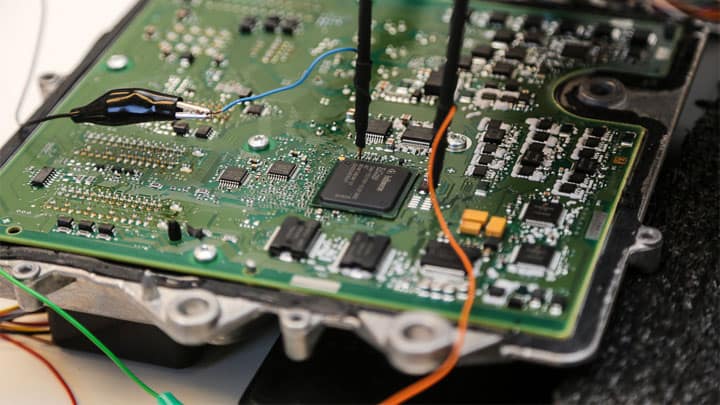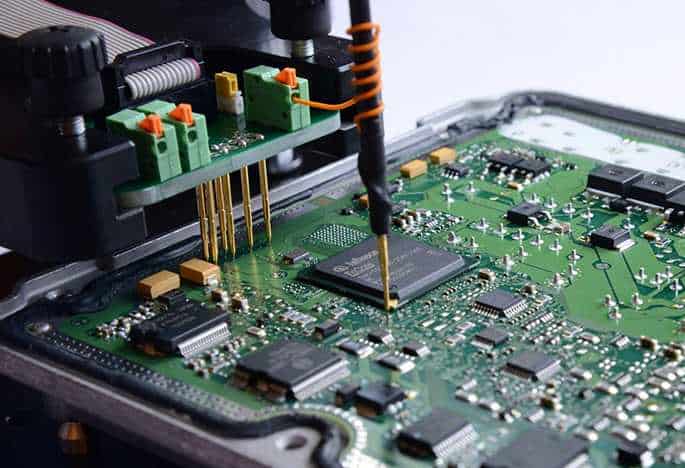In this article, we will delve into the factors that should be considered when choosing between ECU replacement and repair. Helping you make an informed decision that aligns with your vehicle’s needs and budget.

Modern vehicles are equipped with complex electronic systems that play a crucial role in their overall performance and efficiency. Among these systems, the Engine Control Unit (ECU) holds a special place. The ECU, also known as the engine control module, is essentially the brain of your vehicle. It manages and regulates various engine functions, such as fuel injection, ignition timing, emissions control, and more. However, like any electronic component, the ECU is susceptible to failure or malfunction. When that happens, vehicle owners are often faced with the critical decision of whether to repair or replace it.
Read more: Common Engine Control Unit Problems: Understanding, Diagnosing, and Solving ECU Issues
The Engine Control Unit (ECU), also known as the Engine Control Module (ECM), plays a critical role in modern vehicles. It acts as the brain of the car, constantly monitoring and adjusting various engine parameters. To ensure optimal performance and fuel efficiency. However, like any electronic component, ECUs are susceptible to failure over time. Leaving car owners with the crucial decision of whether to repair or replace the unit. This article aims to guide you through the factors to consider when facing the ECU dilemma. Helping you make an informed decision for your vehicle.
Understanding the ECU and its Functions
Before diving into the repair vs. replacement debate, it’s essential to grasp the role of the ECU and its functions. The ECU collects data from various sensors positioned throughout the vehicle, such as oxygen sensors, throttle position sensors, and coolant temperature sensors. It then processes this information to control critical engine functions like ignition timing, fuel injection, and emissions control. A malfunctioning ECU can lead to various issues, such as reduced performance, decreased fuel efficiency, or even a non-starting engine.
ECU Repair
ECU repair involves diagnosing and fixing the specific issue that caused the malfunction. This approach is often more cost-effective than outright replacement, especially if the problem is isolated to a particular component within the unit. Common issues that can be repaired include faulty capacitors, damaged circuit boards, and broken connections. Some specialized repair shops and electronic experts have the skills and equipment to troubleshoot and fix these issues effectively.
Diagnostic Analysis
When your vehicle’s check engine light illuminates or if you notice any abnormal behaviour, the first step is to get a diagnostic analysis. Modern vehicles have sophisticated diagnostic systems that can pinpoint the exact issues and generate fault codes. A qualified mechanic or automotive technician can use specialized diagnostic tools to extract these fault codes and identify the specific problem affecting the ECU.
The severity of the Issue
The severity of the problem detected in the ECU plays a significant role in determining whether repair or replacement is the better option. Minor issues like a faulty sensor or a loose connection can often be addressed through ECU repairs. On the other hand, if the ECU’s main circuit board is damaged or if there is a major internal failure, replacement might be necessary.
Cost Comparison
Cost is a crucial factor for most vehicle owners. ECU repair is generally more cost-effective than outright replacement. Repairing the ECU involves identifying the faulty component and fixing or replacing it, which can be less expensive than purchasing a brand-new ECU. However, it is essential to consider the warranty offered on both repair and replacement options, as it can provide peace of mind for future issues.
Availability of Replacement ECUs
The availability of replacement ECUs can be a deciding factor. Some older or rare vehicle models may have discontinued or hard-to-find ECUs, repairing a more viable option. Conversely, newer vehicle models usually have readily available replacement ECUs. A trusted mechanic or ECU specialist can help you determine the availability of a suitable replacement if required.
Quality of Repair Services
If you decide to opt for ECU repair, it is crucial to choose a reputable and experienced repair service. Ensure that they have the necessary expertise, use quality components, and provide a warranty on their repairs. Low-quality repairs may lead to recurring issues and could end up costing you more in the long run.
Performance and Compatibility
When considering ECU replacement, it’s essential to ensure that the new ECU is compatible with your vehicle’s make, model, and engine specifications. Some ECUs may require reprogramming or reconfiguration to match your vehicle’s unique parameters. Additionally, some replacement ECUs may offer performance enhancements, which could be an advantage if you’re looking to improve your vehicle’s performance.
Time Considerations
The time required for ECU repair and replacement may also influence your decision. ECU repair can often be done faster than finding and installing a replacement unit. However, if the repair requires ordering specific components, the time frame may extend.
Warranty Coverage
Warranty coverage is a vital aspect to consider. Reputable repair services often provide warranties on their repairs, which can be beneficial if the issue resurfaces. Additionally, replacement ECUs may come with their warranties. Be sure to understand the terms and coverage of the warranties to make an informed decision. We at ECU Repairs Give All Our Customers a full 12 Months Warranty. We not only repair the ecu’s but also carry a large number of units in stock ready to swap and are constantly updating our stock lists to hold the more in demand ecu’s and offer our customers a wider range.
Pros of ECU Repair
- Cost-effective: Repairing the ECU can be significantly cheaper than buying a brand-new replacement unit.
- Retains original programming: Repairing the existing ECU ensures that the original programming and settings of the vehicle are retained, which can be essential in maintaining performance and fuel efficiency.
- Environmentally friendly: Opting for repair reduces electronic waste, contributing to a more sustainable environment.
Cons of ECU Repair
- Limited warranty: Repaired ECUs may come with a limited warranty compared to new units, potentially leaving you vulnerable to future failures.
- Difficulty in finding reliable repair services: Not all ECUs can be repaired, and finding a trustworthy and skilled repair service might be challenging, particularly for older or rare vehicle models.
- ECU Replacement: ECU replacement involves purchasing a new or remanufactured unit to replace the faulty one. Remanufactured ECUs are existing units that have been restored to their original condition, while new ones are built from scratch. This option is often more straightforward, especially when the exact problem within the existing ECU is difficult to diagnose or repair.
Pros of ECU Replacement
- Warranty: Most new or remanufactured ECUs come with a warranty, offering peace of mind and protection against future failures.
- Guaranteed performance: A new or remanufactured ECU is likely to perform optimally, enhancing your vehicle’s overall performance and efficiency.
- Availability: Replacing an ECU is generally more accessible than finding a reliable repair service, especially for popular car models.
Cons of ECU Replacement
- Higher cost: The primary drawback of ECU replacement is its higher cost compared to repair. New units, in particular, can be significantly more expensive.
- Programming and adaptation: In some cases, the replacement ECU may need programming or adaptation to match your vehicle’s specific configuration, adding extra costs and time to the process.
- Originality concerns: If you are particularly concerned about preserving the authenticity of your vehicle, using a new ECU might alter some original aspects.
Factors Influencing the Decision
- Cost: Cost is often the most significant factor influencing the decision between repair and replacement. Assess the estimated costs for both options and weigh them against your budget and the value of your vehicle.
- Availability: Consider the availability of reputable repair services and compatible replacement ECUs for your vehicle’s make and model. If repair services are scarce or unreliable, replacement might be the better choice.
- Vehicle age and value: For older vehicles with reduced market value, repairing the ECU might make more financial sense. Conversely, for newer or high-value cars, a replacement could be a wiser long-term investment.
- Warranty: The warranty offered with a replacement ECU can be a crucial factor, in protecting against potential future failures.
- Environmental impact: If you prioritize environmental considerations, opting for ECU repair might align better with your values.
- Expert opinion: Consult with qualified mechanics or specialists to get their professional opinion on the best course of action for your specific situation.
Conclusion
In conclusion, choosing between ECU repair and replacement depends on various factors, including the nature of the problem, cost, availability, and the expertise of the repair service. It is essential to consult with a qualified mechanic or ECU specialist who can accurately diagnose the issue and guide you toward the most suitable option for your vehicle. Making an informed decision can extend the life of your vehicle and save you from unnecessary expenses.
Deciding between ECU repair and replacement is not a one-size-fits-all choice and requires careful consideration of various factors. Both options have their merits and drawbacks, and the decision ultimately hinges on the specific circumstances of your vehicle and your preferences as a car owner. If cost-effectiveness and the preservation of original settings are your priorities, ECU repair might be the way to go. On the other hand, if performance, warranty coverage, and ease of implementation are paramount, replacing the ECU could be the more suitable choice. Regardless of your decision, seeking the expertise of qualified professionals is vital to ensure your vehicle’s proper functioning and longevity.

